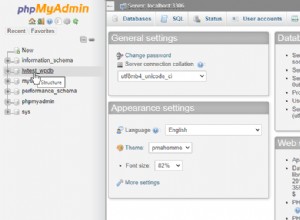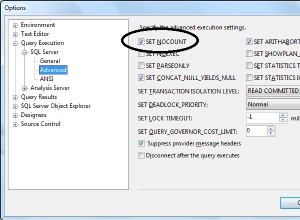votre méthode actuelle n'est pas très efficace. D'autres utiliseront généralement CASE WHEN pour le faire.
SELECT t.uniqueID,
IN_Info1 = MAX(case when t.type = 'IN' then t.information1 end),
IN_Info2 = MAX(case when t.type = 'IN' then t.information2 end),
IN_Notes = MAX(case when t.type = 'IN' then t.Notes end),
OUT_Info1 = MAX(case when t.type = 'OUT' then t.information1 end),
OUT_Info2 = MAX(case when t.type = 'OUT' then t.information2 end),
OUT_Notes = MAX(case when t.type = 'OUT' then t.Notes end)
FROM TABLEB t
GROUP BY t.uniqueID
puis pour incorporer dans votre grande requête, vous pouvez utiliser CTE ou DERIVED TABLE
-- CTE
; with Tblb as
(
SELECT t.uniqueID,
IN_Info1 = MAX(case when t.type = 'IN' then t.information1 end),
IN_Info2 = MAX(case when t.type = 'IN' then t.information2 end),
IN_Notes = MAX(case when t.type = 'IN' then t.Notes end),
OUT_Info1 = MAX(case when t.type = 'OUT' then t.information1 end),
OUT_Info2 = MAX(case when t.type = 'OUT' then t.information2 end),
OUT_Notes = MAX(case when t.type = 'OUT' then t.Notes end)
FROM TABLEB t
GROUP BY t.uniqueID
)
select *
from TableA a
inner join Tblb b ON a.uniqueID = b.uniqueID
Vous ne pouvez pas faire ceci X1.t1.uniqueID. , il ne doit s'agir que de X1.uniqueID




